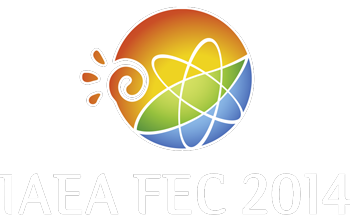Speaker
Dr
Pavel Aleynikov
(ITER Organization)
Description
Runaway electrons (RE) can be generated during plasma disruptions in ITER. A large portion of the toroidal current can then be carried by RE, so that a substantial fraction of the magnetic energy would be associated with the RE current. The uncontrolled loss of such REs in ITER needs to be avoided to minimize the detrimental effects from disruptions. This calls for an adequate means to control or suppress a RE beams in ITER.
Massive Gas Injection (MGI) has been successfully employed to mitigate disruptions in present tokamaks, and is therefore considered to be an essential component of the envisioned ITER Disruption Mitigation System (DMS). Recent experiments has shown, that MGI of high-Z impurities (Ar,Ne,...) into a RE beam leads to a fast current decay.
In the present work, the ITER MGI target parameters are assessed taking into account the interaction of REs with high-Z nuclei. The 2D Fokker-Planck equation is solved, which describes the kinetics of REs, coupled to an electric field evolution model. Enhanced scattering of REs on high-Z impurities was shown to modify the RE distribution function, resulting in the broadening of the velocity distribution as well as a decrease in the average kinetic energy of REs.
As an alternative mechanism of enhanced scattering or stopping REs, the possible excitations of kinetic instabilities (whistlers or magnetized waves) are considered. It was shown, that an instability window for whistlers exists within possible ITER disruptions parameters.
Simulations of RE suppression by MGI revealed that both the RE current and kinetic energy can be successfully dissipated by the injection of a moderate amount of a noble gas, well below ITER technical limitations.
| Country or International Organisation | ITER Organization |
|---|---|
| Paper Number | TH/P3-38 |
Author
Dr
Pavel Aleynikov
(ITER Organization)
Co-authors
Prof.
Boris Breizman
(The University of Texas at Austin)
Dr
Guido Huijsmans
(ITER Organization)
Mrs
Ksenia Aleynikova
(NRC "Kurchatov institute")
Dr
Sergei Putvinski
(Trialpha energy Inc)
Dr
Sergey Konovalov
(NRC "Kurchatov institute")
Dr
Viktor Zhogolev
(NRC "Kurchatov institute")

